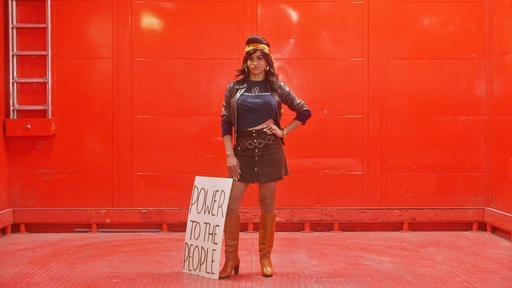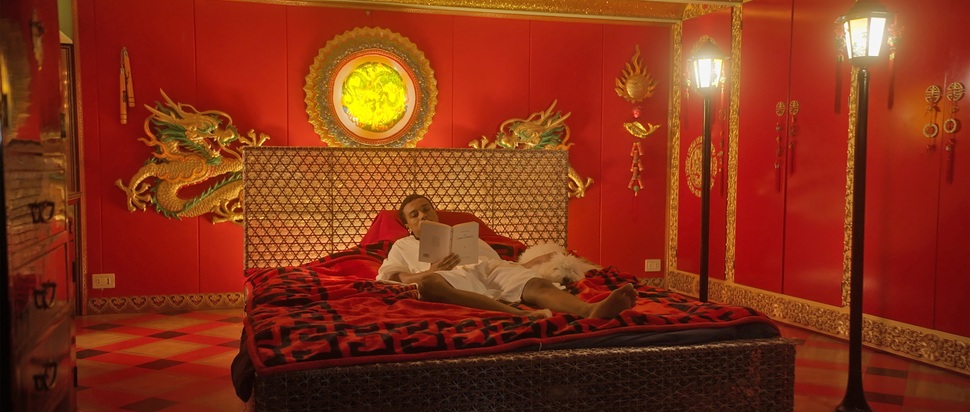Paul B Preciado on Orlando, My Political Biography
Spanish philosopher turned filmmaker Paul B Preciado speaks to us about his bold essay film Orlando, My Political Biography, an adaptation of Virginia Woolf’s seminal 1928 novel Orlando, and so much more
“To tell you the truth, it was not my main concern,” says Paul B Preciado when we mention to the Spanish philosopher that his debut feature, Orlando, My Political Biography, resists easy definition. Is it a documentary essay? A documentary adaptation? A manifesto? A memoir? It’s not quite clear – and such is its charm.
Bringing together 26 trans and non-binary individuals, the film looks to Virginia Woolf’s 1928 novel Orlando, reading and re-reading the text anew via contemporary experiences of non-conforming gender identities. Preciado is well-known for his piercing exploration of gender and sexuality in his writing and this side-step into filmmaking is a boldly experimental and accomplished work.
Preciado was initially approached with an offer to make a film about himself, but a traditional biography wouldn’t do. If there was to be a biography of Preciado’s life, it had to be an adaptation (of sorts) of Virginia Woolf’s Orlando. As Preciado’s voiceover reminds us in the film, “Because fucking Virginia Woolf wrote my biography in 1928.”
When it comes to the hybrid nature of the film, Preciado is very clear. “I have not invented this genre," he says. "This genre already existed – especially in France but also in other places. There is a long tradition of documentary essays questioning this difference between documentary and fiction.”
Particularly, Preciado looks to French-Swiss director Jean-Luc Godard’s work. During filming, Godard passed away, aged 91; improvising, one Orlando – Jenny Bel’Air – brought this into the film, noting her sadness and irrevocably changing the textual and intertextual possibilities of both Preciado and Woolf’s work. “This is a real event that happened exactly the day that we were shooting, but that has now become a part of the story,” says Preciado. In Orlando, My Political Biography, fact and fiction become blurred – delightfully and mesmerisingly so.
He had doubts. Instances of unease in the (im)possibilities of the project. “One of these crucial moments was the moment in which it started to be a collective story rather than being just my own story,” says Preciado. Despite his own obsession with Orlando – from a first reading aged 14 – he was unsure whether anyone else really cared that much about this narrative. It turned out not to simply be his ‘private madness’, though. Preciado called a casting, and over 100 people showed up.

Kori Ceballos in Orlando, My Political Biography.
“First, the Orlandos thought that I would choose one Orlando, that I was looking for the best Orlando, so they would compete with each other,” he says. Rather, Orlando, My Political Biography intended to seek, facilitate and spotlight a political solidarity, as well as the joy such collectivity can bring.
“I worked more with a methodology coming from activism, political activism – so gathering collectively,” Preciado explains. “What is representation for us? How do we want to be represented or cut from philosophy? Basically, I’m trying to ask the question, ‘What does it mean to narrate a story of a life?’” The myriad Orlandos span decades and outlooks. There's nightlife icon and actress Jenny Bel’Air; performer Victor Marzouk; three rosy-cheeked, grinning children; Preciado himself. One young Orlando confided in Preciado, ‘‘I never read the book, but I read the Wikipedia page and through Wikipedia I can tell you, I am Orlando.’’ Such is testament to both the genius of Preciado and Woolf.
With institutional language – medical, legal – so often used to marginalise trans and non-binary people, the collaborative development of the script was crucial. “We read the book together, and then I chose the paragraphs from Virginia Woolf that were best for each of them,” he says. “And then we mixed the language of Virginia Woolf with their own narratives of their lives, their own stories.” Familiar, unfamiliar – yet another binary collapses, beautifully so, as the Orlandos speak their truth and it is uncertain, slightly, whether these words were first written by Woolf or themselves.
It was a tight budget; limited setting and no fancy costumes, sidestepping the finery of Woolf’s novel. With so many Orlandos, Preciado was keen to link them all. As such, the neck ruff came to be, worn by each Orlando. “When you wear this, it gives you this Orlando element that almost transcends the gender binary,” says Preciado. It became “this shared, performative enunciation”, bound to the body – its presentation, its perceptions. Clothing has, of course, historically been used to restrict and control gender, especially that of marginalised or non-conforming gender identities. And so, clothing – a 17th-century style collar, paired with a t-shirt, chain mail, a fringed denim jacket, a crinoline, perhaps – may also liberate. “It opens the present towards the past but also towards the future,” says Preciado. “Because who knows – eventually anyone could actually wear a collar.”
Precaido poses a question. “When you take an adaptation of a novel, you take for granted that it is pure fiction, right?” he asks. “But what if, in a fiction, the main character would be alive?” Orlando is certainly alive – with Preciado and beyond.
Orlando, My Political Biography is released 5 Jul by Picturehouse; certificate 15
